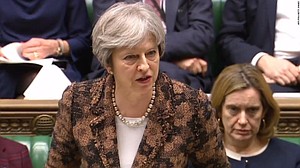3/14/2018

By Joshua Berlinger and Laura Smith-Spark, CNN
(CNN) -- UK Prime Minister Theresa May will outline later on Tuesday how the UK plans to retaliate after Moscow ignored a deadline to explain how a lethal nerve agent was used to attack a former Russian spy and his daughter in Britain.
May will chair a meeting of the UK's National Security Council and then is expected to make a statement to Parliament that could have a profound effect on UK-Russia relations.
She had demanded that Moscow respond by midnight Tuesday, London time, to the UK government's conclusion that Russia was linked to the poisoning of Sergei Skripal and his daughter Yulia on a park bench in Salisbury in southern England.
But the office of Russian Foreign Minister Sergey Lavrov said Moscow would not respond to London's ultimatum without receiving a sample of the substance, setting up a potential showdown between Downing Street and the Kremlin.
The Skripals are critically ill in the hospital after being exposed to the nerve agent, known as Novichok and developed in Russia, on March 4. Thirty-eight other people in Salisbury were seen by medics after the exposure. One, a police officer, remains hospitalized.
May said Monday it was highly likely that Moscow was behind the poisoning. The Russian ambassador to the UK was summoned to the UK Foreign Office to explain whether the attack was directed by Russian authorities, or whether Moscow had lost control of the nerve agent.
Britain has called for an "urgent meeting of the UN Security Council" to "update members on the investigation into the nerve agent attack in Salisbury," the UK Foreign Office tweeted on Wednesday.
Kremlin: 'Unfounded accusations'
Lavrov said Wednesday there had been no progress in his country's communications with Britain.
Speaking alongside his Turkish counterpart in Moscow, Lavrov accused UK authorities of "political theater" and trying to mislead the international community rather than submitting an official request to Russia in accordance with the Chemical Weapons Convention. Russia is ready to respond to an official request within 10 days, in line with its obligations, once it is made, Lavrov said.
Lavrov also said that Russia had no motive in targeting the specific individuals concerned and that all allegations were based on speculation.
Kremlin spokesman Dmitry Peskov similarly rejected "unfounded accusations" of Russian involvement in the attack as he spoke with reporters on a conference call.
"Moscow stands open to cooperation in the investigation of these events. Unfortunately, this is not reciprocated by the British," Peskov said, as he urged other countries to use their "common sense" as they consider whether there is any proof to the claims.
Regarding threats from Russia's Foreign Ministry that Russia would expel all British media organizations from Russia if the UK takes steps to sanction the Kremlin-funded English-language TV channel RT, based in London, Peskov said: "Any illegal action in relation to any Russian media in the UK will be met with a response. These steps will best match the interests of the Russian Federation."
Peskov was challenged by CNN as to why the international community should believe the Kremlin's denials given the widespread allegations against it, including involvement in the 2006 poisoning in London of former spy Alexander Litvinenko, hacking, and meddling in the affairs of the United States, Ukraine and other countries.
In response, Peskov said there was no proof of "hacking attacks, of imagined hacking attacks by Russia ... as to Crimea, there was no annexation of Crimea, these were legitimate decisions passed by the Crimean parliament and supported by the referendum."
Unexplained circumstances
Skripal is believed to have lived in the UK since his release from Russian custody in 2010.
He was convicted in Russia of spying for Britain before he was granted asylum in the UK after a high-profile spy swap in 2010 between the US and Russia.
Since then, a number of Russians have been attacked or died in the United Kingdom. The latest is Nikolai Glushkov, a Russian exile who was found dead in his London home on Monday night.
Glushkov had links to compatriots who died in unexplained circumstances in the UK, but police said there was no evidence to suggest a link between Glushkov's death and Skripal's poisoning.
British Foreign Minister Boris Johnson said the attack against the Skripals was likely the first time a nerve agent has been used in Europe since the end of World War II.
Novichok is believed to be up to 10 times as potent as VX, the nerve agent used to kill Kim Jong Nam, the estranged older half-brother of North Korean leader Kim Jong Un, at an airport in Kuala Lumpur, Malaysia, last year.
France, Germany and the US have all condemned the attack. US President Donald Trump said he believes that the evidence, as it stands, points to Russia as the responsible party.
"It sounds to me like they believe it was Russia and I would certainly take that finding as fact," Trump said.
"As soon as we get the facts straight, if we agree with them, we will condemn Russia or whoever it may be."
